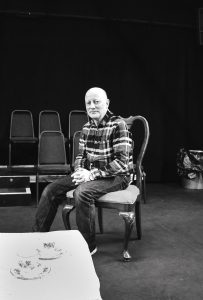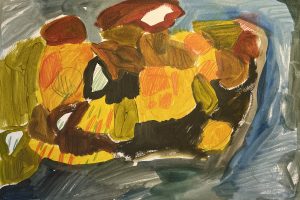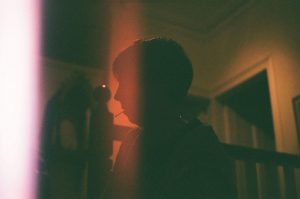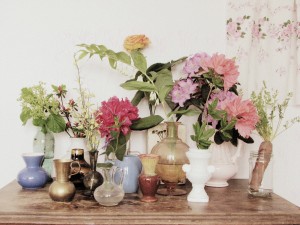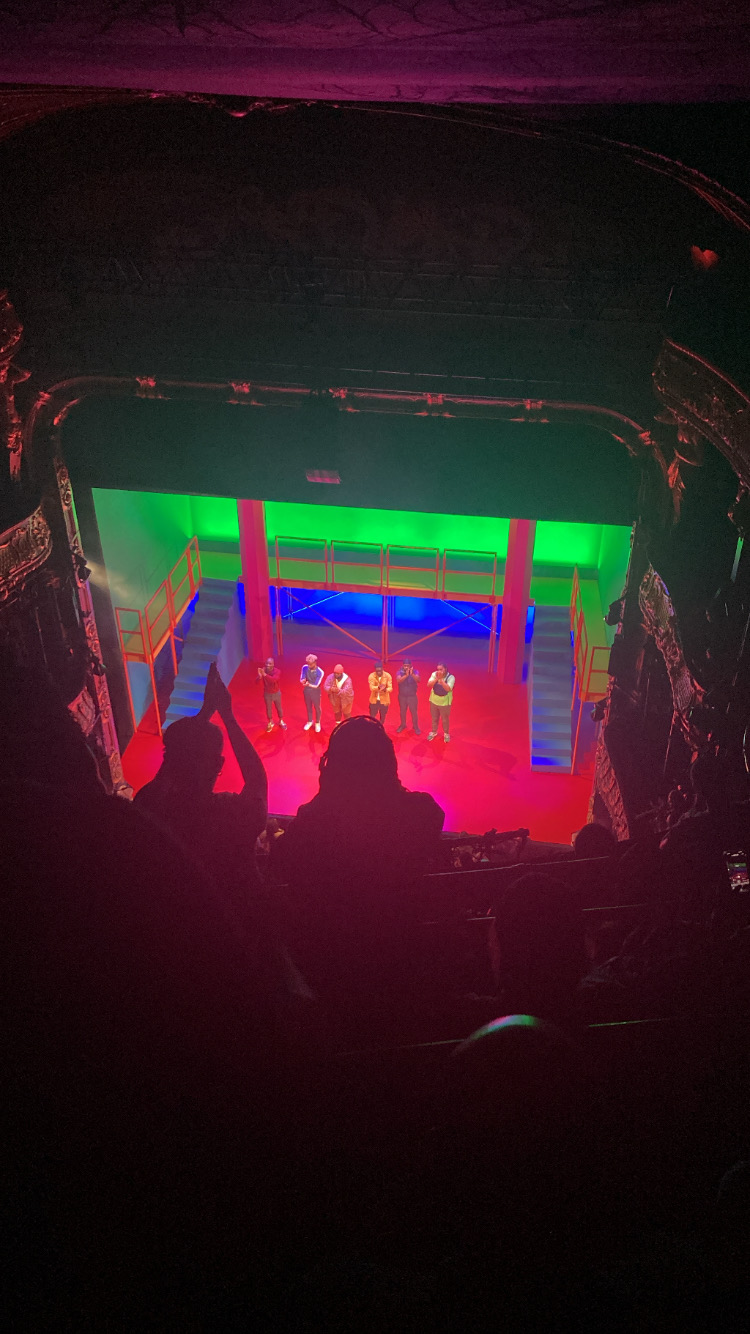
Review: ‘For Black Boys Who Have Considered Suicide When The Hue Gets Too Heavy’ At the Apollo Theatre
by Debbie Ogunsanwo | August 14, 2023
Bodies intertwining under blue lights, the sound of a jazz saxophone rising from glittering synths, six Black men begin to voice their desires.
“Let a Black boy dance, and let him take up as much space as he needs.”
In Ryan Calais Cameron’s astounding and poignant play For Black Boys Who Have Considered Suicide When The Hue Gets Too Heavy, these men do precisely that.
For Black Boys is in its third iteration after two successful runs at the New Diorama Theatre in 2021 and the Royal Court Theatre in 2022. Now it returns to the Apollo Theatre in front of an energetic audience, whose responses and reactions are stitched into the fabric of the play. Echoes of the title, the cast declare in unison that this play “is for Black boys who have considered suicide when the hue gets too heavy,” informing us that for all its joy and humour, mental health struggles and experiences of racism are underpinned throughout.
Cameron’s play delves into a range of pressing themes connected to Black masculinity and mental health, from sex and relationships to suicide and sexual assault. The cast act as both an ensemble and as individuated characters recounting their personal experiences, also inhabiting various roles to tell each other’s stories. Staged through informal conversation between friends, the play explores the conflicting discourse surrounding a series of topics resonant within the Black male community. The characters pose their opinions and open up conversations, discussing a variety of topics including the problem of police presence, whitewashing at university, the use of the n-word, the ‘representation’ (rather, absence) of Black history in schools and much more. They reconstruct past events to communicate their histories and perspectives to the wider group. In one scene, the character Midnight recounts an experience of sexual assault as a child, retracing his emotions and the mental disassociation he dealt with during the harrowing incident. He recalls his inability to articulate the pain of the experience to his family, though we see him find the words to relate it in real time, empowered by a comforting community of brothers who listen patiently. Having the characters literally live out the experiences of their peers is a lesson in empathy, as they embody abusive fathers and anxious teenagers, exploring the trauma of the past in order to make sense of their present struggles. In Calais Cameron’s play, Black men are free to take up space, to discuss and debate anything on their minds. The isolating experience of lockdown during Covid reminds us that space means nothing without the people who fill it, and the men offer counsel to each other just as much as they disagree. Their constantly clashing perspectives are a testament to the openness and safety of their environment, but also to the established brotherhood between them.
Transforming into a playground at the ring of the school bell upon the play’s opening, the stage functions as something of a time machine. Anna Reid’s set design is both fun and functional; the colourful and nostalgic atmosphere of the stage necessarily contributes to the dialogic and discursive form of the play. Dotted with chairs evoking the layout of a group therapy session, it metamorphoses into both the happiest memories and deepest fears of the men that fill it. They run around the stage, inhabiting the bodies of their six-year-old selves for a while, singing playground classics like ‘High Low Chicka Low’. In a world where Black children are adultified well before their time, it is refreshing. However, this youthful joy is interrupted by a harsh recognition of the discrimination that comes with racial difference, and the defamiliarising feeling it often produces.
One of the characters, Jet, begins to recall the time he was shunned on the playground during a game of kiss chase. Jet recounts how he and his dark-skinned classmates were left sitting alone in the middle of the playground whilst all the girls chased a white classmate. It’s moments like these, which society often tells us as Black people to ignore as insignificant, that Cameron’s play explores at large.
But it also interrogates more stark and institutional forms of racism. One scene depicts the vexatious routine experience of being stopped and searched by police as a young Black man. Studies have shown that in 2020, Black people were almost ten times more likely to be stopped and searched than white people, an increase of 52% compared to the previous year. The men talk through the violent threat of police presence, educating the naive Pitch about why holding a perspective which villainises Black men for their experiences of racial prejudice is incredibly harmful. All experiences are validated and given the room to be heard, and at a time when mental health for Black men in this country is in an incredibly fragile state, this production couldn’t be more necessary.
Nevertheless, it is also an exuberant and celebratory ode to Black British people, culture, and history. Cameron’s poetic writing is brought to life by the talented cast, who deliver their lines with exceptional emotional depth, but are full of charm and energy that makes every moment of the play captivating. Punctuated with humorously animated outbreaks into song and dance and specific cultural references that just make sense, Cameron’s play is as joyous and comedic as it is intense. There is an exciting array of musical choices too. Nicola T. Chang’s sound design includes both originally composed music and a soundtrack spanning several decades, which boasts artists from Kwabs and Gracious K to Aaliyah and Carlos Santana. Music is used to narrate experiences, but also to bring the men together. The camaraderie between the actors is testament to their vulnerability and honesty, as well as Cameron’s dynamic direction. The sense of defamiliarisation created by racial prejudice and its effects explored within the play is distilled by the utterly familiar and warm atmosphere Cameron evokes. For Black Boys displays the beauty and manifoldness of Black culture proudly and powerfully on stage, with a playfulness and humour that never fails to leave a smile on your face.
But what Cameron does best is seamlessly manoeuvre material that is both hilarious and heartfelt in a unique way. The play deftly interweaves weighty, emotional scenes with powerful and expressive movement sequences. One of the most unforgettable moments creatively explores the relationship between toxic masculinity, domestic abuse, and generational trauma, illuminating the kind specifically understandable for Black African and Caribbean men in this country. Theophilus O. Bailey’s movement direction is both beautiful and hard-hitting, creating an explosive pre-interval scene that sees incredible hip-hop choreography and physical theatre set to Kendrick Lamar’s ‘The Blacker the Berry’. It’s a powerful close to the first act. Rory Beaton’s lighting not only illuminates the actors under a red glow in the scene, but flashes at us in the audience. Something like an optical breaking of the fourth wall, it reminds us of our existence and role within the play. We are not just spectators, but participants, some of whom find our lives and experiences mirrored in the play. For those of us who don’t, Cameron’s play calls upon us to look at these lives and truly absorb their complexity and reality, stripping away the webs of prejudice from our gaze that anti-Black ideology has woven throughout history.
A memorable scene movingly explores homosexuality and homophobia within the Black community, and one character’s navigation of desires forcibly hidden due to his fear of censure from his peers. The lyrical vignette incorporates fluid physical movement and dance, encapsulating the tension between the joy of fleeting romantic experience and the repression its ephemerality encodes. Jet describes his experiences in a dark alleyway, and Cameron’s poetic description of the “purple sky that looks like it’s been painted on” sets the scene for us. Jet emotively sums up his experience when he tells us that “Being Black is hard enough; being Black and queer can seem a cruel and impossible proposition.” A culminating, tender embrace between two men on stage inspired applause from the audience that testified to the compelling nature of the segment. Cameron’s play reminds us of the varying facets of identity and experience that make up Black lives, rejecting the homogeneity that Black people are laden with. As Jet reminds us from early on, Black men “are not a monolith”, and his assertion of self-identity here despite his anxieties attests to this. Throughout the play, the audience’s responses moved between roars of laughter and sniffles amidst the silences. From up in the crowded balcony with rows of heads peering down, I couldn’t always see the emotion, but I could feel it.
Traces of the play’s source text, Ntozake Shange’s influential For Colored Girls Who Have Considered Suicide / When the Rainbow Is Enuf are visible beyond the title. However, it doesn’t dedicate time to explore the misogynoir embedded within the Black community, or the experiences of Black trans men – areas validly warranting attention. Nevertheless, the play packs a lot into the 2 hour 35-minute runtime, and this is precisely why we need more plays like it – theatre by and for Black people of varying backgrounds, which spotlights our community in authentic and compelling ways. There is a thread of hope amongst all the play’s melancholy. At the end, the men envision the sanctuary in which they wish to dwell. No longer beneath cool blue lights, they stand with interlocked arms under warm yellow ones, like the light of the sun Jet wants to be “close enough to…kiss” without burning. There is no clarification on what the relationship between the six men exactly is, but it doesn’t matter because the bond they possess transcends that. Cameron’s ending tells us the world they affirm exists not just in language, but in reality. It is a world visible on their horizon, one they can begin to reach out and claim. There, stood together, this world seems like something conceivable, attainable, and inhabitable.∎
Words and photography by Debbie Ogunsanwo.
